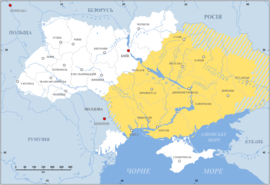Wild Fields
The Wild Fields (Ukrainian: Дике Поле Dyke Pole, Russian: Дикое Поле, Dikoye Polye, Polish: Dzikie pola, Lithuanian: Dykra, Latin: Loca deserta, sive campi deserti inhabitati, also translated as "the Wilderness") is a historical term used in the Polish–Lithuanian documents of the 16th, 17th and 18th centuries to refer to the Pontic steppe north of the Black Sea and Azov Sea. The somewhat ambiguous location has been usually defined as lying between the Don River on the east, Kiev on the north, and the left tributaries of the Dniester on the west. Until the 17th and 18th centuries, the region was only sparsely populated with nomadic Nogais and consisted mostly of unpopulated steppes, so the name of "wilderness" came to be applied to it.
The territory was ruled by the Golden Horde until the Battle of Blue Waters (1362) which allowed Algirdas to claim it for the Grand Duchy of Lithuania. As a result of the Battle of the Vorskla River in 1399, his successor Vytautas lost the territory to Temur Qutlugh, the khan of the Golden Horde. In 1441 Yedisan, the western section of the Wild Fields, came to be dominated by the Crimean Khanate, a political entity controlled by the expanding Ottoman Empire from the 16th century onward.
...
Wikipedia

